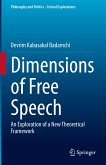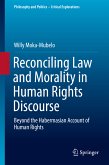This book dives headfirst into the contemporary controversy over the limits of free speech. Changing conceptions of what constitutes legitimate harm coupled with the advent of the internet and social media have provided a challenging environment for defining the boundaries of acceptable speech in our contemporary society. This book argues that these problems emerge due to flaws in our free speech framework, leaving the argument for free speech vulnerable to becoming inverted into a justification for censorship. In response, this book argues for a version of free speech based on a framework of toleration. Drawing on the work of the philosopher Rainer Forst, a new justification for free speech is formulated - reflexive freedom of speech - which aims to overcome past issues and justify free speech in a way that is universal, consistent and just.
Benjamin Walters is a research fellow at the Australia Institute in Canberra, Australia. His research interestsinclude theories of free speech, culture war, toleration and justice. He holds a PhD in Philosophy from Deakin University.
Dieser Download kann aus rechtlichen Gründen nur mit Rechnungsadresse in A, B, BG, CY, CZ, D, DK, EW, E, FIN, F, GR, HR, H, IRL, I, LT, L, LR, M, NL, PL, P, R, S, SLO, SK ausgeliefert werden.









